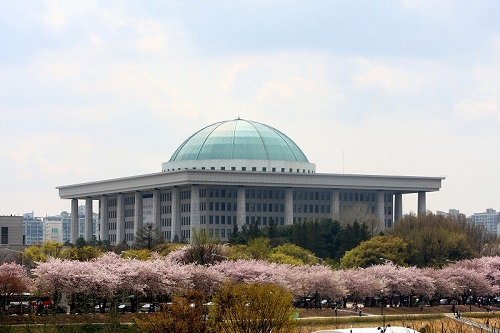Let’s Talk About the 2020 Legislative Election
 |
| ▲ A picture of the National Assembly of the Republic of Korea. |
April 14, 2020, is the day when South-Korea’s 21st Legislative Election will take place. Apart from the worldwide fear of Pandemic due to the coronavirus, interest in the upcoming general elections is heating up. The upcoming legislative election is an important event that picks the people who represent Korean citizens in the National Assembly, and can evaluate the present government performance. This election has changed by revising the Public Official Election Act on the December 27, revising Mixed-Member Proportional (MMP), and the expansion of voting rights based on age. Here are some things to know about the changes in the 21st legislative election.
Starting this election, Korean citizens that were born before April 17, 2002, (age 18 and over) can vote in the 21st legislative election. This is unlike past elections, where the minimum voting age was 19 years old. By expanding the voting rights of generation Z (people born from the mid 1990s the early 2010s), the population of eligible teenage voters increased by over a million. The change in voting age through the Public Official Election Act could be one of the key points in this upcoming election, there may be a marked difference in preferences shown between generations.
One of the changes in this election compared to the past is the imposition of MMP. In this legislative election, voters will elect representatives to fill 253 seats for local members and 47 seats for the proportional representative members picked by each of their parties. The district election’s 253 seats are allocated by the size of the local population. Until the last legislative election, the district election and the proportional representation will be held independently. However, from this election onwards, the proportional representative election will be Mixed-Member Proportional. With MMP, 30 seats for proportional representative members are allocated based on the proportional representation election results linked with the district election’s result. The last 17 seats are allocated purely by the results for proportional representation. The MMP system could be expected to induce a multiparty system and a pluralist democracy by securing seats for minor parties, those that receive fewer votes in a proportional representative election, as opposed to a district election.
The MMP has also received some criticism. South Korea will be using MMP for the first time in this upcoming election, but there are several countries (Japan, Germany, and New Zealand) that have already used MMP before. In Germany and New Zealand, the countries solve the gap between the district election rate and proportional representative rate by expanding the number of congress seats. In South Korea, the MMP handles this problem with the decimal point system. This decimal point system has a suspicion about the eligibility of realization of the pluralist democracy by this system has a suspicion about the eligibility of realization of the pluralist democracy by this system, and some people have been vocal about their opinions on the expanding congressional seats like in Germany’s MMP. Also, there is criticism about the regulations on minor parties that don’t get over 3 percent of seats in the district election, makes banded minor parties in the proportional representation election. This regulation can obscure the purpose of the Public Official Election Act’s modification for the realization of a multiparty system.
Due to the extended teenage vote authorization, this legislative election will surely reflect young people’s opinions on national policy. The low turnout of young voters, however, may put a dent in the influence of young voters. The low voting turnout of certain generations may give an advantage to certain groups. Voting is the essence of democracy. South Korean people had been struggling to get a system of direct election for several decades. All citizens of voting age need to use their right to vote as members of a democratic nation.
By Park Jiwon, cub-reporter
By Park Jiwon, cub-reporter pjw6263@naver.com
<저작권자 © The Campus Journal, 무단 전재 및 재배포 금지>

 Shrinkflation, Consumer Deception
Shrinkflation, Consumer Deception




